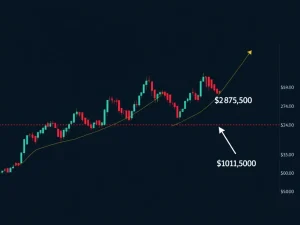Japan Crypto Tax Reforms: Unlocking a Breakthrough Era for Digital Assets

Japan is on the brink of a monumental shift in its approach to digital assets. For years, crypto investors faced a challenging tax landscape. Steep rates, climbing as high as 55%, discouraged participation. This system also pushed many traders away from Japan’s shores. Furthermore, it placed crypto at a significant disadvantage compared to stocks, which enjoy a flat 20% tax. However, the ruling Liberal Democratic Party (LDP) has now committed to substantial reforms. These changes promise a more favorable flat tax rate for cryptocurrencies. This pivotal move could reshape Japan’s standing as a global hub for digital assets. The upcoming Japan crypto tax overhaul aims to provide much-needed relief and foster Web3 innovation. Consequently, this article explores the LDP’s proposed reforms and their potential impact on the homegrown Japanese crypto market.
Japan’s Crypto Tax Overhaul: A Landmark Shift
The current crypto tax regime in Japan is notoriously stringent. Investors must navigate a system that taxes crypto transactions at progressive rates, peaking at 55%. This policy has severely hampered growth. It has also driven considerable talent and investment out of the country. In contrast, traditional equities benefit from a straightforward 20% flat tax. This disparity created an uneven playing field. Consequently, many in the crypto community advocated for change.
Significantly, the Liberal Democratic Party (LDP) now champions these reforms. Their proposals seek to introduce a flat tax rate for crypto gains. This adjustment would align digital assets with traditional investments. This strategic move aims to invigorate the sector. It also intends to position Japan as a leader in the global digital asset space. Therefore, these reforms are not merely about tax adjustments. They represent a broader commitment to fostering a vibrant Web3 ecosystem.
Key Pillars of the Proposed Crypto Tax Japan Framework
The proposed tax regime is likely to take effect in fiscal year 2026. This implementation remains subject to parliamentary approval. This change marks a significant departure from the existing system. The core of the reform involves replacing progressive tax rates, which can reach 55%, with a flat 20% rate. This aligns crypto taxation with that of equities. Furthermore, the reforms introduce crucial investor protections. These include equities-like insider trading regulations for cryptocurrencies. This prevents unfair profits from private information, such as token listings or protocol changes. Thus, it strengthens market fairness and integrity.
This tax reform is not an isolated measure. Instead, it forms part of a broader economic strategy. The goal is to integrate cryptocurrencies with traditional investments. This makes them more competitive and better regulated. Additionally, the 2025 tax review may incorporate other investor-friendly measures. For example, it could allow three-year loss carry-forward provisions. This brings crypto in line with equities. Such a provision offers vital flexibility in a volatile market. It also improves portfolio risk management for investors. The Financial Services Agency (FSA) is actively preparing the detailed proposals. These proposals will solidify the new framework. This comprehensive approach aims to build a robust and fair environment for digital asset trading. Therefore, the proposed crypto tax Japan framework addresses multiple aspects of market operation and investor confidence.
Fueling Innovation: How Japan Embraces Web3
Japan’s journey with cryptocurrency regulation has been complex. In the aftermath of major incidents, the nation adopted some of the world’s strictest rules. The Mt. Gox collapse in 2014 and the Coincheck hack in 2018 were pivotal. These events led to rigorous standards from the FSA. Specifically, these standards covered crypto exchanges, custody services, Anti-Money Laundering (AML), Know Your Customer (KYC) practices, and cybersecurity. Investor protection became the paramount concern, sometimes at the expense of innovation. This cautious approach ensured security but also stifled growth.
However, under former Prime Minister Fumio Kishida, Japan began a strategic shift. His administration introduced a broader ‘New Capitalism’ and Japan Web3 strategy. This signaled a clear embrace of blockchain technology and decentralized finance (DeFi). The government recognized the need to retain domestic tech talent. It also aimed to maintain global competitiveness in the digital economy. Public consultations and legislative planning are now underway. These efforts seek to recalibrate Japan’s crypto policy. The goal is to strike a balance between security, innovation, and Web3-friendly growth. This forward-looking approach underscores Japan’s commitment to becoming a leader in the digital frontier.
Impact on the Japanese Crypto Market and Global Ambitions
If Japan enacts its proposed tax reforms, the impact on the Japanese crypto market will likely be profound. Both corporate and individual adoption of crypto assets should accelerate significantly. Lower taxes and clearer regulatory guidelines will boost market liquidity. They will also attract substantial institutional capital. Furthermore, these reforms encourage the development of robust digital asset infrastructure. This includes new platforms and services.
The reforms also align with a larger national objective. Japan aims to position itself as a global digital finance hub. This puts it in direct competition with crypto-friendly jurisdictions like Singapore and the UAE. A regulated, investor-friendly environment will help draw global capital. It will also stimulate domestic markets. Consequently, it strengthens Japan’s role in the Web3 economy. Optimism surrounding these reforms is already evident. Metaplanet, Japan’s largest corporate Bitcoin holder, was recently added to the FTSE Japan Index. This signifies growing mainstream acceptance. On August 25, 2025, the company further solidified its position by purchasing another 103 BTC, raising its total holdings to 18,991 BTC. This indicates a strong belief in the future of digital assets within Japan.
Navigating Challenges and Shaping Crypto Regulation Japan
Despite the widespread optimism, Japan’s proposed cryptocurrency tax reforms face several challenges. The inherent volatility of digital assets remains a primary concern. This volatility prompts ongoing questions about market stability and investor protection. Regulatory enforcement presents another significant hurdle. Ensuring compliance with new insider trading rules requires robust oversight mechanisms. Developing and implementing these effectively will be crucial. Moreover, parliamentary approval for the 20% flat tax rate may encounter delays. Political debates or competing legislative priorities could prolong the process. Therefore, careful navigation of these challenges is essential for successful implementation.
Nonetheless, Japan’s planned 2026 reforms signal a major policy shift. They move toward a more investor-friendly environment. This also strengthens the country’s global positioning in the digital asset space. These changes are expected to pave the way for rapid growth in the Japanese crypto industry. They should also foster the emergence of yen-backed stablecoins like JPYC. With these comprehensive crypto reforms, Japan is laying the groundwork to become a leading regulated cryptocurrency hub in Asia. This appeals to both retail and institutional investors. It offers enhanced clarity, tax parity, and robust infrastructure. The evolution of crypto regulation Japan demonstrates a commitment to innovation while maintaining market integrity. This article does not contain investment advice or recommendations. Every investment and trading move involves risk, and readers should conduct their own research when making a decision.









